A Bad Dream in the Making? Reflecting on the Recent Riots in the UK – by Eszter Halasi
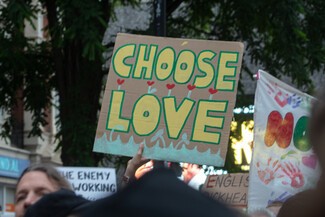
“I left a country where my child was mistreated. I don't want to live in a country where we have to hide our Roma heritage or the fact that we are not English.”
Eszter Halasi, a Roma photo-journalist originally from Hungary but now settled in England, reflects on the recent anti-immigration and anti-Muslim hate riots that swept England, Wales, and Northern Ireland, following the tragic killing of three little girls at a dance class in Southport. Far right agitators on social media spread disinformation about the killer, claiming wrongly that he was an immigrant and Muslim, leading to attacks by gangs of thugs on Mosques, shops, people's houses, on ethnic minority people, a hotel housing Asylum seekers and a library - and on the police trying to protect them. Eszter Halasi went to one of the counter-protests in Brighton and reported on it for the Travellers' Times.
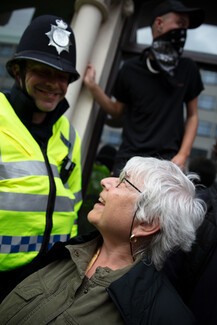
Just one week ago, an inexplicable tragedy struck, shaking the entire English society to it’s core when three little girls at a Taylor Swift themed dance class were killed by a man armed with a knife. The initial shock and sorrow about this was palpable across the country. Yet, amid this collective grief, a disturbing undercurrent began to surface. A handful of far-right influencers spread disinformation about the killings, leading to some people to take it upon themselves to become vigilantes. Together, they unleashed a wave of riots, hate and vandalism that swept across the nation, further compounding the sense of fear and unease.
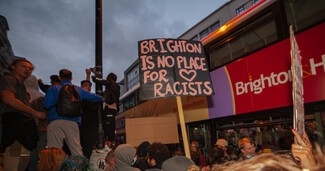
At that time, I was in Slovakia, far removed from the turmoil back home. I was there to represent my photographs at an exhibition, staying in a small village near the Tatras, where the world felt distant. The tranquility of rural life was a stark contrast to the chaos unfolding in England. Upon my return, I was met with an overwhelming flood of news reports detailing the riots that had erupted.
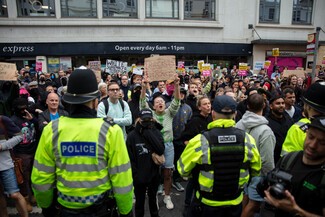
August 2nd marked the 80th anniversary of the Roma Holocaust, a solemn day meant for remembrance and reflection. Yet, this year, it was marred by unsettling images of men giving Nazi salutes, images that filled both the news and social media. It left me questioning: How could this be happening in 2024? And in England, of all places - a country I chose for my children so they wouldn't face discrimination because of their skin colour. I fled a country where my child endured daily abuse from schoolmates. Here, I believed we were safe. For 11 years we lived with that sense of security. But Brexit in 2019 shook my confidence, making me wonder if the English had ever truly accepted us. We are migrants, and we are Roma. Now, I no longer feel secure.
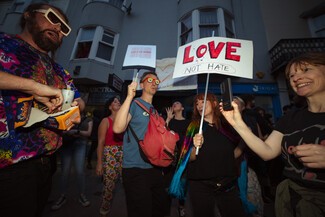
Despite my fear, I felt a strong urge to act, to show solidarity with those under attack. I attended an anti-fascist and pro-migrant and refugee protest in Brighton and came home feeling a sense of relief and renewed hope. The protesters were kind and supportive; their presence and voices were for us, the migrants, too. I was moved to tears and smiled when I saw their signs and heard their chants. They were standing up for us - for me. What could be more beautiful than knowing that English people stand with us, for us?
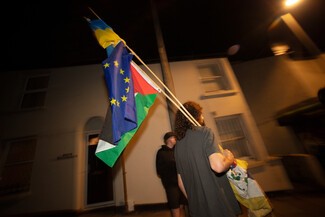
Later that night, my son called me from the train station, asking where I was. I hesitated to speak Hungarian in public, so I hung up the phone. Earlier, I had already asked my son to stay home, even though he no longer has an accent. I left a country where my child was mistreated. I don't want to live in a country where we have to hide our Roma heritage or the fact that we are not English.
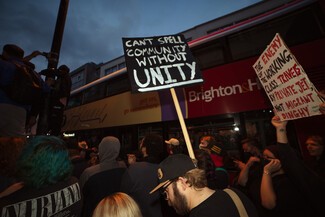
When I moved to England, I found a welcoming country filled with kind-hearted people. I hope that the violence of the last few days quickly fades away, becoming nothing more than a bad dream, and the parents of the three little girls can now grieve in peace.
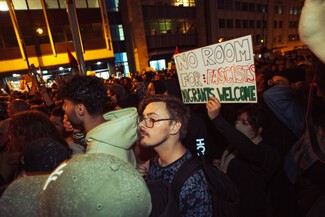
Words and photographs by Eszter Halasi for the Travellers’ Times